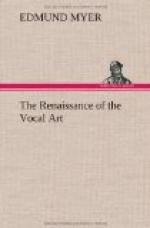Singing, as we have said, is more psychological than physiological. This whole system of flexible, vitalized movements, is first aroused by right thought, and finally applied and controlled through the mind or will, in response to feeling or emotional impulse. In this way we are able to arouse and use at will the persuasive, the impressive, the fervent voice; the voice that is something more than mere sound; the voice that has character and magnetism.
Compare two voices that are equal in every way in regard to power of tone, compass, and control. The one varies the color and character of the tone continually with the change of thought and sentiment, and is enabled thereby not only to avoid monotony, but to use the impressive, persuasive voice, the tone the sentiment demands. In this way he has magnetic power and influence over an audience. The other voice may be bright, free, and clear, yet may use the same quality or color of tone constantly on all styles of singing, and on all degrees of power, it matters not what the thought or sentiment may be; and this style of voice is by no means uncommon, even among many of our public singers. Now consider the difference in the commercial value of these two voices, which should bear at least some relation to their artistic value. No artist can be truly great or fully developed without the power of vitalized, emotional energy, and variety of tone color and character.
Sing a tone, about the middle of the voice, without other thought than that of simply pure, free tone. It will be found that in the most beautiful voice the tone will be common-place, meaningless; in many voices it will be simply sound. Now place yourself in every way upon a higher, a more lofty plane. Think of higher ideas and ideals. In other words, idealize the tone. Remember, the ideal is the truth, and not exaggeration. Appeal to your emotional energy, the singer’s sensation, and give expression to thought and feeling aroused in this way. Give expression to an actual life-throb, whether it be of love or hate, of joy or sadness, of ecstasy or despair. The result, the change of tone, character, and quality, will be astonishing, will ofttimes be electrifying. In this way make the tone actually mean something. Feel like a singer, assert yourself, express thought, sentiment, feeling, emotion, and not simply sound.
Simple sound, as a rule, is meaningless and unnatural. Nature demands, for the expression of beautiful, artistic tone, that all the powers she has given the singer—the powers, physical, mental, and emotional—be brought into action and put into the tone. Character and magnetism of tone must be aroused in most voices. This cannot be done through the mechanical and mental powers alone. It requires the study and development of the emotional energies of the singer. In other words, the singer must put himself, not only upon a physical and mental level, but upon the emotional level of the tone as well.




